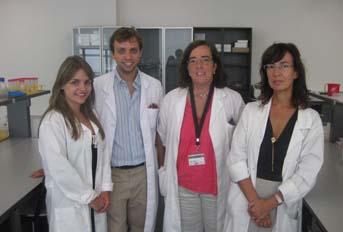Associação Portuguesa de Investigação em Cancro
Modulação da angiogénese e inflamação pelo isoxanto-humol
Modulação da angiogénese e inflamação pelo isoxanto-humol

Um grupo de investigadores do Departamento de Bioquímica da Faculdade de Medicina do Porto demonstrou que o isoxanto-humol, um polifenol natural, regula a angiogénese e a inflamação.
Através da análise da retina de ratinhos tratados com este polifenol, e dos resultados obtidos em culturas celulares de células endoteliais e de músculo liso vascular demonstraram que o isoxanto-humol diminui a proliferação celular e o crescimento dos vasos sanguíneos, assim como a sua maturação e estabilidade por diminuição do recobrimento dos vasos com as células murais.
Os investigadores demonstraram ainda que este composto diminui a expressão de fatores inflamatórios como o TNFα e o NFkB.
A regulação simultânea da angiogénese e inflamação pelo isoxanto-humol reveste-se de grande interesse dado que estes dois processos se encontram frequentemente associados em patologias como a diabetes, as doenças cardiovasculares e o cancro.
Autores e Afiliações:
Rita Negrão, Delfim Duarte, Raquel Costa, Raquel Soares
Departamento de Bioquímica (U38-FCT) da Faculdade de Medicina da Universidade do Porto. Portugal
Department of Biochemistry (U38-FCT), Faculty of Medicine, University of Porto, Porto, Portugal
Abstract:
Isoxanthohumol modulates angiogenesis and inflammation via vascular endothelial growth factor receptor, tumor necrosis factor alpha and nuclear factor kappa B pathways.
Negrão R, Duarte D, Costa R, Soares R
Department of Biochemistry (U38-FCT), Faculty of Medicine, University of Porto, Porto, Portugal.
Angiogenesis and inflammation are becoming distinguished players in the pathogenesis of many heterogeneous diseases, such as diabetes, cardiovascular disease, and cancer. Therefore, it is crucial to study new compounds that are able to modulate these events. Isoxanthohumol (IXN) is a polyphenol with antioxidant, anti-inflammatory, and antiangiogenic properties. The aim of this study was to evaluate the effects of IXN on blood vessel proliferation and maturation and describe underlying molecular mechanisms in endothelial cells (ECs) and vascular smooth muscle cells (VSMCs). Angiogenic profile of IXN was analyzed by retinal angiogenesis at different time points. IXN modulation of angiogenic and inflammatory signaling pathways was evaluated by Western blotting on EC and VSMC cultures. IXN inhibited by 20% sprouting angiogenesis and decreased vascular coverage by mural cells up to 39%. IXN of 10 µM also decreased inflammatory signals, namely tumor necrosis factor alpha (TNF-α) (26 and 40%) and factor nuclear kappa B (24 and 42%) in human aortic smooth muscle cells (HASMCs) and human umbilical vein endothelial cells (HUVECs). Angiogenic regulators, including vascular endothelial growth factor receptor 2 (HUVEC, 55%), angiopoietins 1 (HUVEC, 39%; HASMC, 35%), angiopoietin 2 (HUVEC, 38%), and Tie2 (HUVEC, 56%) were also inhibited by 10 µM of IXN treatments. Akt activation was reduced by 47% in HUVEC-treated cells and Erk activation was also reduced by 52 and 69% upon IXN treatment of HUVEC and HASMC. IXN seems to regulate in vivo vascular proliferation and stabilization and the EC-VSMC-inflammatory crosstalk, leaving this molecule as an interesting nutritional player for angiogenesis and inflammation-related diseases.
Revista:
Biofactors. 2013 Aug 1. doi: 10.1002/biof.1122.
Link:
http://onlinelibrary.wiley.com/doi/10.1002/biof.1122/pdf




